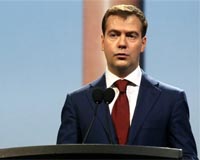| . |  |
. |
Washington (UPI) May 11, 2009 As the famous song by Vietnam-era band Buffalo Springfield goes, "There's something happening here; what it is ain't exactly clear." The same can be said about the Middle East peace process today. There is something happening, but no one seems quite sure what that is, and those who do know are keeping the news very close to their chests. But what appears to be filtering through the maze of Middle East peacemaking is that something is being prepared. "There is something cooking," Alon Ben-Meir, a professor at New York University, told this reporter last week. Ben-Meir, who follows the peace process closely, said he had been told by Arab diplomats that there was something afoot. Ben-Meir and others all said they would not be surprised if President Barack Obama was to make a major announcement either after his meeting with Israeli Prime Minister Binyamin Netanyahu, after the two leaders meet in Washington on May 18, or perhaps even when President Obama visits Egypt on June 6, the 42nd anniversary of the 1967 war. And when one adds up all the bits and pieces scattered around the Washington Beltway and beyond, it seems clear that a plan is being worked on by the Obama administration. What seems to be in the works is an adapted -- or revised or amended, if you prefer -- version of the Arab peace initiative that was originally presented at an Arab League summit in Beirut in 2002. The initiative, initially the brainchild of former King Fahd of Saudi Arabia, offered instant recognition and peace to Israel by all 23 members of the Arab League -- the 22 member states and Palestine. And although the Arabs, via the voice of Amr Moussa, the Arab League secretary-general, have already stated that they would not agree to alter or amend the proposal, nothing is ever written in stone when it comes to politics. The striking difference this time in attempting to establish a lasting peace in the Middle East is that the administration is going to try to solve the entire morass in one big lump, rather than try to separate the issues and say that a certain issue can be left for future discussion. That will not work. To solve the Middle East morass, a global, or at least a pan-regional solution needs to be found. That means that the following issues need to be tackled, and then, the pieces need to be pre-fitted so that the entire Middle East puzzle may be solved. Here are the issues that need to be addressed: First, the "right of return" of Palestinian refugees to their original homes in historic Palestine; second, the issue of final borders; third, the status of Jerusalem, and fourth, security for the state of Israel. Now add to that list the subtexts of each item, such as, in the eventuality that Israel was to permit a token few to "return," which ones would be allowed into Israel and under which criteria? And who would decide? Next comes the Syrian dossier, one which cannot be ignored because as long as the Syrians remain outside the peace process, there will be no peace process, let alone any peace. And of course Syria wants the Golan Heights, which was captured from Syria in the October 1973 Arab-Israeli war. Now one needs to factor in Lebanon, too. Israel still occupies two small areas in south Lebanon -- the Shebaa Farms and the village of Ghajar. Hezbollah, the Lebanese Shiite movement, has been fighting Israeli troops on and off for more than a decade over these two localities. It is the continued presence of Israeli forces in these two sites in south Lebanon that gives Hezbollah legitimacy to continue maintaining its weapons and to refer to itself as a resistance. This all seems to sync with one of King Abdullah of Jordan's latest statements about the possibility of a meeting involving Lebanon, Syria, Israel and Jordan, as well as other Arab countries and of course the United States. Suddenly, after years of stagnation, there seems to be a renewed sense that things are on the move once again. "There is some hope in the air," Philip Wilcox, a former U.S. ambassador to the Middle East, told this correspondent last week. (Claude Salhani is editor of the Middle East Times.) Share This Article With Planet Earth
Related Links
 Don't rewrite WWII history: Medvedev
Don't rewrite WWII history: MedvedevMoscow (AFP) May 8, 2009 President Dmitry Medvedev on Friday lashed out at "malicious attempts" to falsify the history of World War II, saying Russia's heroism in the conflict should never be put into doubt. The remarks by Medvedev, which coincide with the celebration of Victory Day in the country on Saturday, reflect increasing frustration in Russia with the position of its ex-Communist Bloc western neighbours towa ... read more |
|
| The content herein, unless otherwise known to be public domain, are Copyright 1995-2009 - SpaceDaily. AFP and UPI Wire Stories are copyright Agence France-Presse and United Press International. ESA Portal Reports are copyright European Space Agency. All NASA sourced material is public domain. Additional copyrights may apply in whole or part to other bona fide parties. Advertising does not imply endorsement,agreement or approval of any opinions, statements or information provided by SpaceDaily on any Web page published or hosted by SpaceDaily. Privacy Statement |